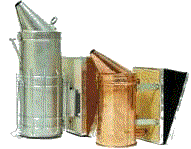
After protective clothing, I have found
this to be the next most important item to have. When I first started
beekeeping, I was advised to buy as large a smoker as I could afford,
and also to avoid tin (which has a very limited life span). I was also
advised to buy either a smoker made copper or stainless steel construction.
I considered the options and eventually
decided to buy a large copper smoker which I still have and which is
still in good working condition, some 10 years later. I may add that
it is battered/dented but still working. However, a few years ago, I
invested in a arge stainless steel model and this is the one that I
now use the most as it is much more durable than copper.
I believe that the advice I was given
still stands, as a small smoker naturally does not stay alight for very long without constant attention, and is not
therefore
very reliable.
So, I would advise anyone taking up
beekeeping to buy the best equipment and tools that
you can afford at the time; it will be a wise investment. The KEY
word here is confidence and I discovered that having the right equipment
at the
very beginning
helped me to be in control of the bees.
Don't panic:-)
Fuel...
After years of constantly trying
an assortment of materials,
I now always use the following 'ingredients' to fuel the smoker:
 Egg cartons without any of the plastic label. (Must
be really dry - keep it in the house/airing cupboard or glasshouse) Egg cartons without any of the plastic label. (Must
be really dry - keep it in the house/airing cupboard or glasshouse) |
 Small chunks
of rotten wood Small chunks
of rotten wood |
| |
Instructions
First make sure that the inside of the smoker is clean,
scrape away as much
of the 'tar' as you can from inside the spout.
(The smell from this residue is disgusting, so imagine
how the poor
bee feels)!
(A method of cleaning smokers is to pour boiling
water
over the "tar" build up, which helps to soften it, so it can then removed with a scourer)
Tip courtesy of Don Nairn
Then, light the newspaper and insert a small quantity loosely into
the smoker, followed by 'chunks' of the broken up egg carton. (Nb. Best not to use the lid of the egg carton as the plastic label will contain chemical residues, harmful to the bees.)
This will allow much more air inside for better combustion.
Give it a couple of puffs, then loosely fill up the smoker with
the
bits of rotten wood. If all is well, the smoker should now
be
working very well indeed. I also
sometimes add a mixture of dried
up
orange peel, a couple of sprigs of rosemary/lavender and/or other
sweet smelling herbs.
I find that these extra 'natural' ingredients lend a much more
pleasant odour to the smoke which then seems not quite so
objectionable to the bees!

Use
as little smoke as possible, in fact
you could try gently removing
the cover board first, without using the smoker at all, just to see
what mood they are in, you may sometimes be pleasantly
surprised to find that no smoke is required.
(Always have your Smoker lit though and close to hand in case you do need it)
However, if the bees
are positioned on the frames with their tails exposed...
then beware. If it is necessary to use smoke, use as little as possible, and
always direct it across the top of the frames,
never down into
the brood chamber which will only cause
a mass exodus of bees from the front
entrance of the hive.
Important
I tend to think that every bee counts, so I try very hard to avoid
crushing any bees when replacing the excluder,
super or cover board.
A slight application of smoke does the trick and leaves the way clear to replace the above items.
Gently 'slide' the super or cover board into place in order to
give any stragglers a chance to fly out of harms way.
Remember:
Dead bees may still release an alarm scent the next time
you open the hive, which is a good reason to try and avoid killing them!
 I
also use a small puff of smoke to clear the top bars
of bees
before
scraping away the accumulated wax.
Tip - A paint scraper works very well for this job and a wide one
will do more than one frame at a time!
I
also use a small puff of smoke to clear the top bars
of bees
before
scraping away the accumulated wax.
Tip - A paint scraper works very well for this job and a wide one
will do more than one frame at a time!
I have seen some 'so
called experienced'
beekeepers scraping away this wax,
quite oblivious to the poor bees which are still there, these same
people then wonder why the temperament of the bees has changed the
next time they open up the hive!
